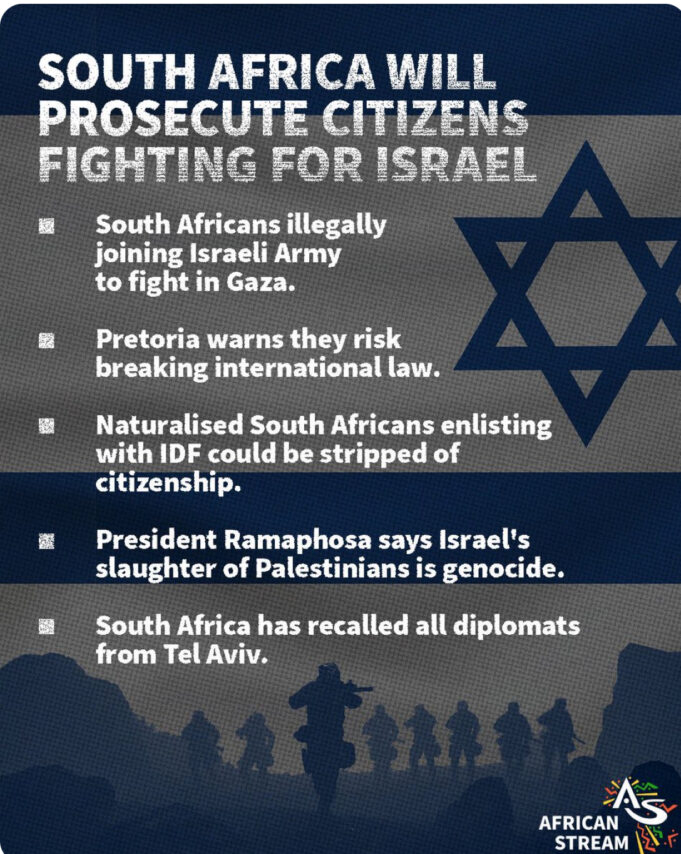African countries began walking a diplomatic line after the October 7 Hamas attack in Israel that included strongly held principles, diplomatic expediency, and empathy in the wake of unfolding carnage in the region.
Ghana’s foreign affairs minister stated that it “unequivocally condemns” attacks by Hamas and called for the group to withdraw its fighters from Israel. Rwanda issued a similar statement condemning the attacks stating, “The current situation is worrying and needs an urgent de-escalation,” reported semafor.com.
South Africa, with its history of apartheid, declared via its foreign minister, that while the country decried the escalation of violence, it was emphatic that the conflict had arisen from Israel’s “continued illegal occupation of Palestine land, continued settlement expansion, desecration of the Al Aqsa Mosque and Christian holy sites, and ongoing oppression of the Palestinian people,” semafor.com reported.

After three months into Israel’s incessant carpet bombing of Gaza and increased brutal attacks on the civilian population in the West Bank, Africa joined the UN General Assembly (UNGA) in its member states overwhelming vote for a ceasefire.
When Liberia’s representative at the UNGA voted Dec. 12 with the U.S. and Israel against the ceasefire, you could hear a loud outburst from the West African country’s president. In fact, the Sunday after the vote, Liberia’s President George Weah, said, while speaking at a church service, “A wicked person in the embassy when they told us to vote, that person whatever they did—that Liberian that voted for war is a wicked Liberian, and God will not spare that person, and every person’s life that was taken in that war because that person voted, they will also feel the wrath of the true living God.”
What the wrath looks like in government terms is anyone’s guess. But suffice it to say Liberia’s vote was amended to reflect the majority members of the UNGA. According to the Middle East Monitor, “The Liberian Foreign Ministry has requested the UN General Assembly reverse the ‘No’ vote and register a new vote in favor of the Gaza ceasefire.”
Not to be outdone, South Africa, home to the continent’s largest population of Ashkenazi Jews, has threatened to prosecute those Jews illegally fighting for Israel in Gaza. The South African government cautioned those with dual citizenship who join the Israel Defense Forces (IDF). Its citizens need permission from their government to fight overseas, noted Africa Stream, a Pan-African digital media group. South Africa’s President Cyril Ramaphosa once again denounced the conflict as “genocide.”
South Africa’s foreign ministry issued a statement saying, it’s “gravely concerned” by reports that some South African nationals have joined the Israeli Defense Forces to fight in Gaza or are considering doing so.
“Such action can potentially contribute to the violation of international law and the commission of further international crimes, thus making them liable for prosecution in South Africa,” the ministry said.
According to the African Stream: “They also need permission from their (SA) government to fight in overseas conflicts, but Pretoria is firmly against Israel’s assault on Gaza and describes it as genocide. It’s also called on the International Criminal Court to investigate Tel Aviv over war crimes.”
The five bullet points made via @african_stream on X, formerly Twitter, included, “Naturalized South Africans enlisting with the IDF could be stripped of citizenship.”
Adding to the possible prosecution of citizens for joining the IDF, South Africa has submitted the necessary paperwork to the International Criminal Court (ICC) to bring war crime charges against Israel over its “genocidal war in Gaza,” President Ramaphosa said.
Gaza’s Ministry of Health reports that nearly 20,000 Palestinians have been killed, the majority being women and children, and nearly 53,000 wounded, and many thousands unaccounted for, buried under rubble due to incessant bombing by Israel.
After African governments’ initial division on reactions to the conflict, “there are now numerous indications that most African governments, key African political factions, and substantial portions of African public are sympathetic to the Palestinian cause and appalled at the current Israel military campaign in Gaza,” stated NewArab.com or Al-Araby Al-Jaded, a London-based pan-Arab news outlet owned by Qatari company Fadaat Media.
The growing support is apparent on the streets of the African continent. In defiance, but also with the support of autocrat, Egyptian President Abdel Fattah el-Sisi, supporters of occupied Palestine defied a protest ban. Critics accused el-Sissi, who won a third term in office, of using the pro-Palestinian sentiments for political gain.
Also in North Africa, pro-Palestinian protests have been stronger than in sub-Saharan Africa, with even Morocco—a signatory to the Abraham Accords has permitted huge protests. Huge pro-Palestinian gatherings also have occurred in Algeria.
In sub-Saharan Africa, on the other hand, even the governments of some Muslim-majority countries have been reluctant to allow protests to proceed. In Senegal, even though protestors were initially denied permission, a protest did eventually go forward in Dakar.
Some of Africa’s largest protests occurred in South Africa, given the historical solidarities previously mentioned. Another significant protest occurred in Nigeria among Sunni and Shi‘a Muslims. Follow @JehronMuhammad on X, formerly Twitter













